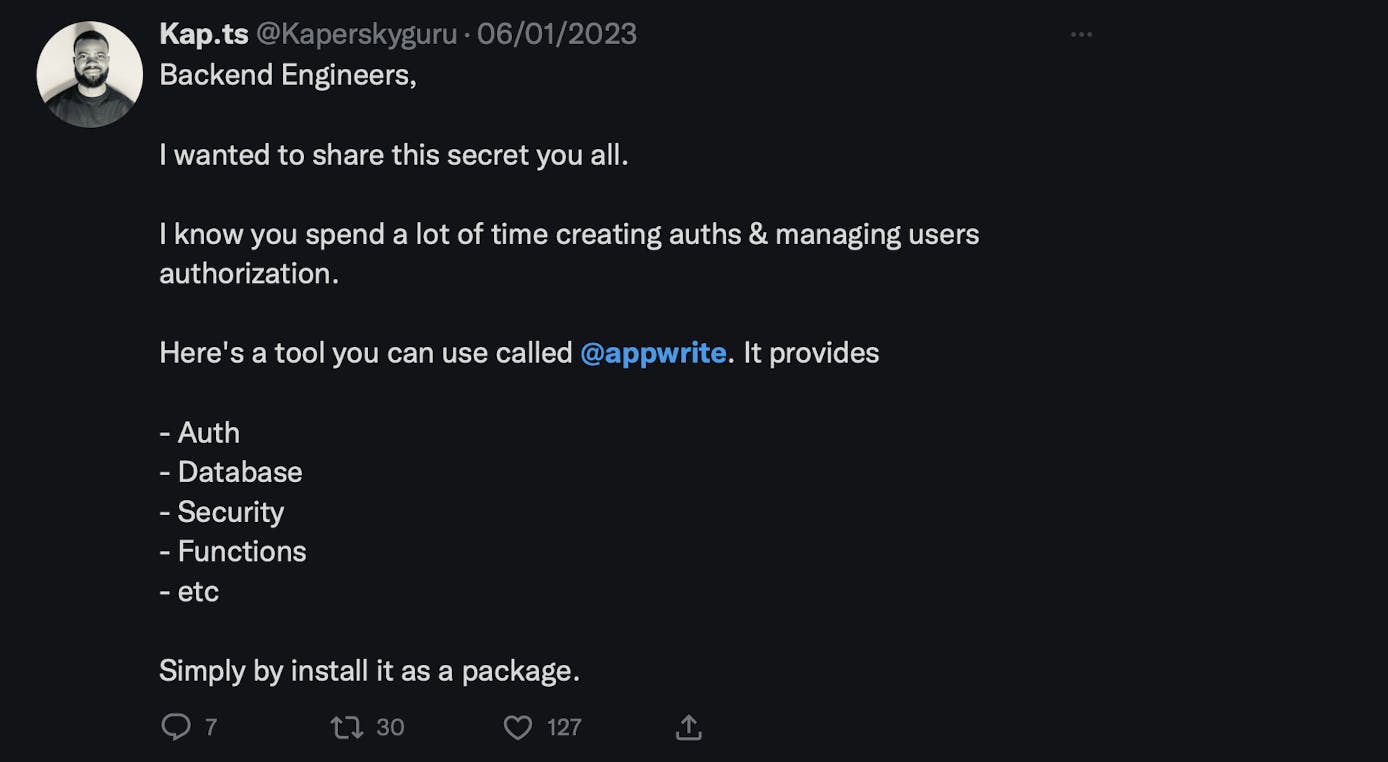Appwrite: The Easiest Way to Integrate APIs into Your Applications
I happen to have heard about Appwrite in the past, glanced at one or two videos but it never really resonated with me until a friend of mine posted a tweet about it and I decided to take a closer look at Appwrite and my interest was truly activated.
It could be due to my current mindset towards software development and creating products, but I find Appwrite to be a fascinating and intriguing platform and product.
Giving credit to whom it's due, here is the tweet that sparked my interest.

Therefore, I have decided to do a series of articles about Appwrite and this first article will be a quick overview and a comparison of the Appwrite Database with traditional Database terminologies.
What is Appwrite?
Appwrite is in my humble estimation, definitely a powerful and flexible platform for developers, one that provides a wide range of APIs for various services such as database management and administration, file storage and management, and authentication.
The Authentication Component of Appwrite is incredibly powerful and robust.
With Appwrite, developers can easily integrate these services into their applications, saving time and effort. Appwrite provides a very clean and user-friendly interface, thus making it easy for developers to get started and quickly add new functionality to their applications.
With Appwrite, not only do you have access to a user-friendly interface for performing actions, but the platform also offers SDKs that can be seamlessly integrated into your software application workflow. No matter what type of app you are building, whether it's built using React, Vue, Astro, Svelte, or Solid, there is a client SDK available for you. Additionally, if you're looking to build an API, the platform's server SDK can be easily leveraged. Appwrite also caters to mobile app developers, offering a Flutter SDK for your convenience.
With the overview out of the way, let's talk Databases.
Appwrite Databases
One of the key features of Appwrite is its database service, which provides a NoSQL document-based database. This type of database is considered to be more flexible and scalable than traditional SQL databases and allows for easy storage and retrieval of data.
Appwrite also supports various query operators such as filtering, sorting, and pagination, making it easy for developers to retrieve the specific data they need. Additionally, Appwrite provides an easy way to manage and monitor usage, billing, and access to resources, enabling developers to control costs and avoid overages.
I would like to outline how the Appwrite Database terminologies map to traditional SQL database terms so the concepts are easily grasped.
| Appwrite Database Terms | SQL Database Terms |
| Database | Database |
| Collections | Tables |
| Documents | Rows |
| Indexes | Indexes |
| Queries | Queries |
| Aggregations | SQL Aggregate Functions |
| Transactions | Transactions |
If you're familiar with databases like MongoDB, the concept of Appwrite's Database service may not come as a surprise to you. However, the great thing about this service is that even if you primarily work with SQL databases, the user interface allows you to easily structure your data.
I hope you find this helpful and sufficient to give Appwrite a spin, let me know what your experience with it is like; so far I am quite pleased and will share more information as I explore the tool.
In summary, Appwrite is a comprehensive and user-friendly solution for developers looking to improve their workflow and increase their productivity.
